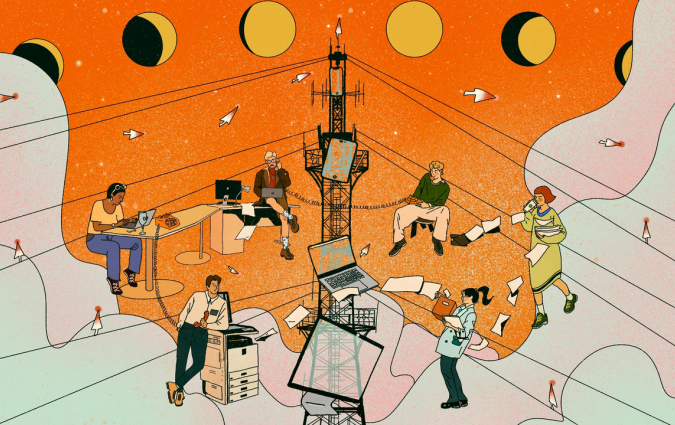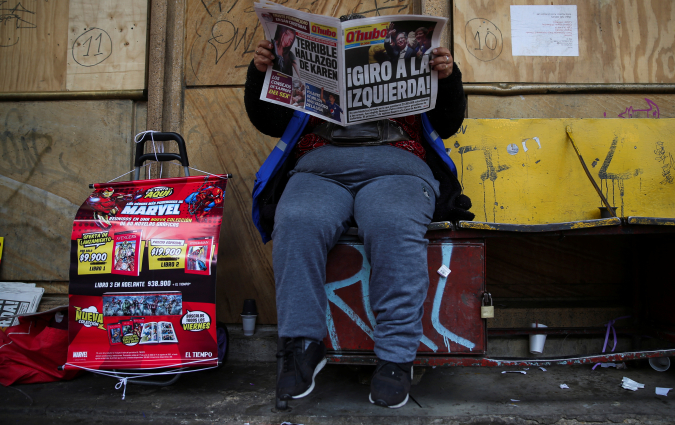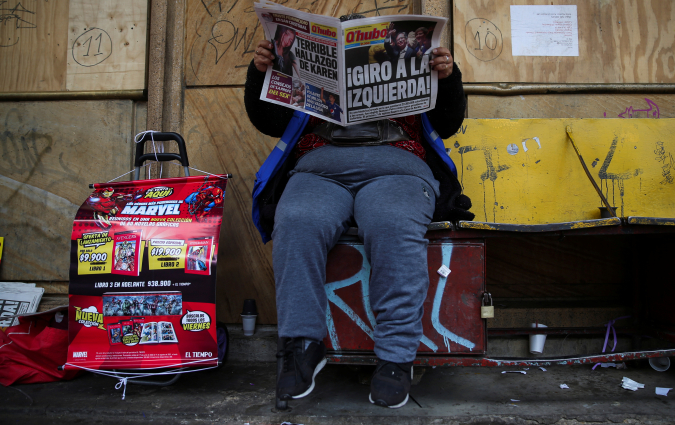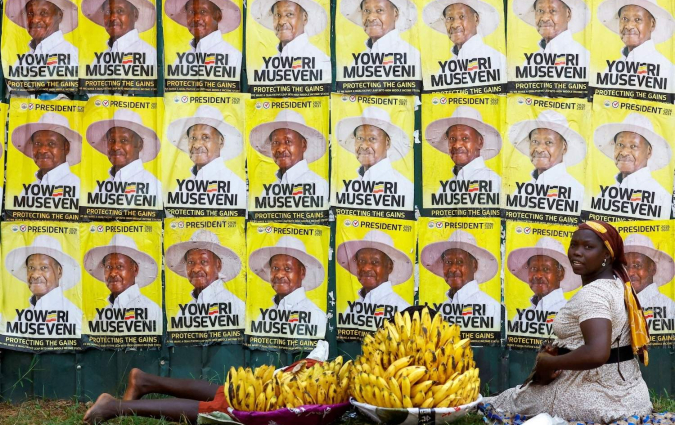Columbia Journalism Dean Jelani Cobb on covering Trump: “There is even more fear than in 2016”
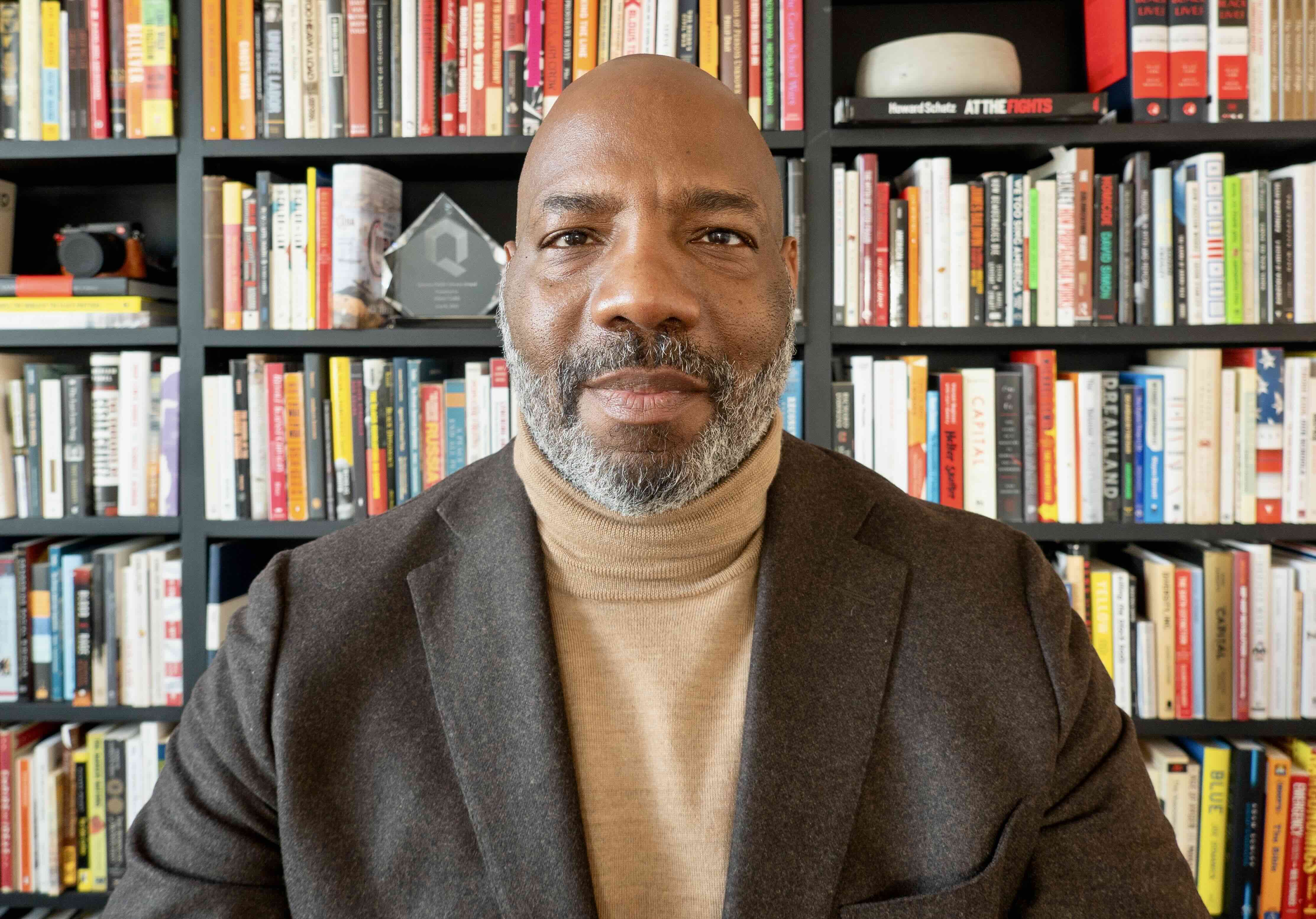
Jelani Cobb, Dean of the Columbia Journalism School.
If Jelani Cobb were a literary character, his origin story would involve the day his mother took him to the South Hollis branch of the Queens Public Library to get his first library card.
Cobb was only eight, but the library soon became the cornerstone of his world as a child. “Everything I’ve been able to do has flowed from the moment I received my first library card. No matter what I do, I don’t think I can ever completely repay that debt,” he wrote after accepting one of the Queens Public Literary Awards in June 2022.
The child who once lost himself in Greek mythology and science fiction at that library grew up to become a staff writer for the New Yorker, one of America’s most prominent public intellectuals and the Dean of Columbia Journalism School. The school was the product of Joseph Pulitzer’s vision, who used part of his fortune to create both a center to champion reportorial excellence and the annual prizes given in his name, announced every year from the famous World Room.
Cobb earned degrees at Howard and Rutgers University, and fellowships from the Ford Foundation, the Fulbright Foundation and Harvard University. As a historian, his mentor was David Levering Lewis, author of a canonical two-volume biography of sociologist and civil rights activist W. E. B. Du Bois. As a journalist, he cut his teeth at the Washington City Paper under the leadership of the late David Carr, whom Cobb paid tribute in this poignant obituary.
Since those early days, Cobb has chronicled race in America in hundreds of articles and several seminal books. He wrote a history of hip-hop and an essay on the rise of Barack Obama. Along with David Remnick, he’s the editor of the collection The Matter of Black Lives, which features dozens of articles from the New Yorker, including classic essays from James Baldwin and Toni Morrison, and this piece Cobb published in 2016.
Cobb was a finalist for the Pulitzer Prize in Commentary in 2018 and received a Peabody Award for this 2020 PBS documentary on voting rights. On 10 March he will deliver the Reuters Memorial Lecture, the Reuters Institute’s most important annual event. Cobb follows in the footsteps of distinguished speakers such as A. G. Sulzberger, Carlos F. Chamorro, Alessandra Galloni, Patrícia Campos Mello, Rebecca Corbett, Siddharth Varadarajan, Marty Baron and Melissa Bell.
I recently spoke to Cobb in an hour-long video call. We discussed the state of American journalism, his role as a journalism educator, and the challenges posed by Donald Trump’s return to the White House. Our conversation has been lightly edited for clarity and length.
Q. Is journalism better equipped now to cover Trump than it was in 2017?
A. In some ways it is, and in some ways it is not. In 2017 people were a little bit stunned, and there was a reluctance to admit what was happening. So you would frequently see people rounding up Trump’s actions as the nearest sane explanation. On the other hand, there was a general sense that we had to prepare people to work in a difficult moment.
Now things are very different. We are familiar with the firehose of mendacity and untruth. We know what they are capable of. But the landscape has changed, and we've seen people be more compliant. Obviously, the instances at the Washington Post and the Los Angeles Times [refraining from making a presidential endorsement] are tremendous. But I also see more hesitance among journalists to report or engage with this administration. Ironically, not so much because of the administration itself, but because of their particular organisations. There is a lot of fear, probably even more fear than there was in 2016.
Q. You are a Queens man. Does this give you any special insight about Trump?
A. Absolutely. Queens is the most diverse county in the United States: more than 400 languages are spoken there. But it was once the second-whitest part of New York City, and it changed very rapidly after the immigration laws changed in 1965. So people who are about Trump's age never recovered from seeing all of these people from so many places come to the place where they lived. It's not a coincidence that the most xenophobic modern American politician is from the most diverse county in the country. Those two things are connected.
Q. Trump is often presented by the press as an aberration to the country’s political traditions. Why do you think this misconception refuses to die?
A. You are way ahead of the curve by recognising that he is not an aberration. Many people in the American media didn't recognise this for a very long time, and some people probably still don't. But there’s a history of right-wing populism in this country. There’s certainly a history of hostility toward immigrants and black people. All of those things are elements of the movement that we’ve seen coalesce around Trump.
This goes back to the Populist Party, or to people like Tom Watson or George Wallace or Pat Buchanan. The difference is that we’ve never had that kind of overt demagogic politics in the White House. But we’ve had it in so many other places that it becomes dishonest to say that he is an aberration. He represents an actual tradition.
Q. Do you think that journalists from marginalised communities or foreign-born journalists were more clear-eyed about this?
A. Yes. American journalists can learn a lot from their counterparts abroad, particularly those with experience operating in authoritarian environments. We should consult with journalists from Hungary and the Philippines.
I thought about this a few years ago when I attended the Committee to Protect Journalists’ yearly dinner. That dinner is held in New York every year for a particular reason: we believe that these journalists who are persecuted will be safe here. But this assumption no longer holds and now the tables are turned. We should be talking to those journalists about how to proceed.
What protocols should we employ? What things should we be thinking about? I don't think it’s as extreme as it is in many other places, but it is headed in an extreme direction, so we should be thinking about this ahead of the curve.
American journalists can learn a lot from their counterparts in authoritarian environments like Hungary and the Philippines. I don't think it’s as extreme as it is in many other places, but it is headed in an extreme direction
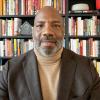
Q. Would you say that the First Amendment has offered American journalists a false sense of security, given some of the moves that we’ve seen recently?
A. It is not just the First Amendment, but the belief that the President would comply with the Constitution. The idea that someone could just blatantly thwart the Constitution itself doesn’t register with people.
When Trump was first elected, I said he would never leave office peacefully. People thought I was extreme for saying that, but it was very obvious. People just didn’t want to see it. The only thing that saved this country on January 6 2021 was that he’s not really competent. A more competent autocrat would have known how to steal power. He didn’t know what he was doing. His incompetence was the biggest asset democracy had that day.
Q. Journalists are often criticised by left-leaning audiences who demand stronger wording, reject the use of official sources or would like to see a sharper focus on the victims of some of these policies. What would you say is the best way to approach coverage right now?
A. We have to listen to our critics. That doesn’t mean we necessarily agree with everything they say. For instance, there has been this widespread derision of independent reporting from people who think we need to put our thumb on the scale and lead readers to conclusions. That’s a terrible idea. It’s the worst thing we could do.
But sometimes you don’t need a great deal of familiarity to understand the way a headline has been framed. Look at what happened around the war in Gaza. We saw all kinds of obfuscating headlines, pretending that nothing was happening or suggesting people were just dying. We’ve seen the same thing with some coverage of the Trump administration. This generally betrays a willingness to avoid difficulty or complexity, or to say things that people may be upset by. I don’t think we can afford to do that.
Q. Many people have criticised the New York Times for interviewing people in Trump’s orbit such as Steve Bannon, Curtis Yarvin and Marc Andreessen. You can argue they are influential and it’s important to know their thinking. How can journalists approach them in a way that’s useful to audiences?
A. I think the platform matters. If somebody is going to interview Steve Bannon with an eye toward pointing out his many contradictions, I think that can be useful in print. For broadcast? Maybe not. It might not be the way that I would do it.
We do have a certain kind of public responsibility. If we were to interview a vaccine denier, they would still have the capacity to make more people avoid vaccines, even though we know that vaccines have saved lives. So I think it’s OK to put our finger on the scale for that person, because that person is lying or at least shown to be wrong in a way that is harmful to the public.
Q. You mentioned Gaza before. Trump spoke about building condos in Gaza and got lots of coverage. Some covered this as if it was a serious proposal, some denounced it as ethnic cleansing, and others pointed out how no one in his inner circle knew about this in advance. How should journalists cover statements like this?
A. People try to make it seem like there's a simple way of doing this, but it’s hard. My gut feeling, and this is not definitive at all, is that we should treat [these comments] the way we would treat a tantrum from a child. When your kids are little and they fall out on the floor, you just ignore it. You don’t want to reward that behaviour. Otherwise, you get more of it. The key thing is policy. So unless he shows up with a blueprint showing how they’re going to build condos in Gaza, then it’s just more talk from him.
Trump delights in saying things that outrage people, or make them fearful or concerned. We should only lead with this story when he presents a bill and goes to Congress with it. Otherwise, we just end up chasing our tails with Trump saying things that he knows we will have to track down while they’re doing the things that actually make a difference in terms of policy.
We should treat [Trump's Gaza comments] the way we would treat a tantrum from a child. When your kids are little and they fall out on the floor, you just ignore it. You don’t want to reward that behaviour. Otherwise, you get more of it
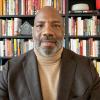
Q. Many reporters have published excellent investigative journalism on so many different corners of Trumpism. But those articles are often too long or behind a paywall, while falsehoods or twisted narratives are often short, visual and free. Should journalists rethink how they present their work?
A. I don’t think that’s it. There’s a lot of hard-hitting reporting that is publicly accessible. But there’s never been a one to one ratio between important work and the work that your audience picks up. You do a brilliant story, and no one cares. But, weirdly enough, you can publish that same brilliant story six months later and people run out into the streets in protest.
I often tell my students the ratio between work and impact is unknown and unknowable. And if you think that you’re doing this because there’s a one to one ratio between the work that you do and change in the world, then you should go into a different profession. But we should keep doing our work because at some point, like a lottery ticket, we get to that random moment where it does make a huge impact.
Q. With the rise of reader revenue models, some of the best news organisations in the world have all the incentives to focus on college-educated and affluent audiences. Is that a problem for journalism going forward?
A. It is a problem, but it is part of a bigger problem, which is that we’ve always had media that was oriented towards a particular audience. The forms of media that have collapsed are the parts oriented towards other audiences. So until we figure out how to serve those publics, we’ll wind up with the kind of skewed orientation that we have.
And then there’s tabloid and cable news, which are directed at particular audiences and meant to stoke outrage. That still exists and is going strong, but what we don't have is the kind of thoughtful, accessible counter-balance.
Q. Is it frustrating to hear people complain about the media when they are often complaining about things like cable news?
A. When people start complaining about the media at a social gathering, I usually just close my ears. People are very often making a generalisation based on one media source or one kind of outlet, which is not to say that we are above reproach.
The media is an incredibly broad array of different kinds of entities that do different things in different places for different audiences. When people say the media, though, they often think it’s one club of people in a room smoking cigars and deciding what we are going to say. That can be a little bit frustrating.
When people criticise the media, they are often making a generalisation based on one media source. The media is an incredibly broad array of different kinds of entities that do different things in different places for different audiences
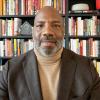
Q. Many young Americans are getting their news from a mixture of independent writers, activists and podcasters. How different is this phenomenon from what we’ve seen in the past? One can argue these influencers are an updated version of Rush Limbaugh and other talk radio hosts.
A. I don’t think this is something new. What I think is different is its relative market share. Limbaugh had a huge audience too, and there were different personalities from that time that were as inflammatory, if not more inflammatory, than some of the people we hear now. But the difference is that we had a vibrant media ecosystem at that time, and there were lots of other kinds of things that people were listening to.
Today, audiences are wildly fragmented and what we now call the legacy media has been weakened. So the floor has been opened for those kinds of people who are not bound by journalism ethics and the methodologies and principles of reporting. They just hear something and go with their gut. This becomes a big part of the news conversation and that’s dangerous.
Q. Is there anything journalists can do to convey that what we do is different?
A. We have to tell our own story. People don't know what we do or how we do it. I recently watched the movie She Said on a flight, and I thought it was great. One of the things that was really interesting to me was how the late André Braugher, who played [New York Times editor] Dean Baquet, turns down the reporters [Jodi Kantor and Meghan Twohey] like three times in the movie. They are like, “We have a story.” And he’s like, “You don’t have a story.” He keeps sending them back to dig for more information.
Most Americans don’t know anything about the kind of semi-antagonistic relationship journalists can have with their editors. We have to be much better at telling our own story. For every major story that we do, we should include a hyperlink to a piece that says how it was reported. You should be able to click on this and see that I got a tip from a person, which then led me to file a request for these documents, which then led me to confront this city council person, and then interview this person, this person and this person. And this is how this story came to be.
We are often asking the public to trust us, and we shouldn’t ask them to just give us their trust in a blanket fashion. We should be as transparent as possible about everything that’s on the plate in front of them that they are about to eat. How we cooked it, how we sourced it, all these kinds of things.
Q. Despite the decimation we've seen in many places, local news organisations remain more trusted than other sources, and we’ve seen some green shoots with nonprofits popping up in different places. Is there now a clear playbook on how to rebuild local newsrooms?
A. It’s green shoots, as you said. We don’t have a playbook yet, because a playbook would be firmer than what we have. We have ideas and general hunches, but that’s more than we had a few years ago. We are still trying things.
I would also say that we should allow ourselves to be excited about this moment. If it weren’t for all the calamity around us, we would be shouting from the rooftops that this is the most innovative time in modern journalism history. A neutral observer would say this industry is really dynamic. But meanwhile, we're kind of more crying in our coffee.
Q. Ownership is at the forefront of many media debates right now. Every ownership model has its limitations. Would you say there is one that’s better than others in terms of protecting editorial independence?
A. An expert on election law recently told me that there were no neutral forms of voting [early voting, voting by mail, voting on election day]. They all give unintentional advantages to people who fall into one category or another. So you have to have many ways of voting so that the advantages of one are cancelled out by the advantages of others. Then you get as close as possible to an even playing field.
Q. I can see the analogy.
A. All of these ownership models we have are flawed. All of them have various shortcomings, and that’s why we need a diverse news ecosystem. Then the shortcomings of one model would be cancelled out by the shortcomings of another.
One model I’m intrigued with is the idea of an endowed news organisation: an entity with a particular amount of money that is set aside to generate revenue, with the revenue it generates becoming its own annual budget. That’s capital intensive: it requires a lot of money upfront but it seems promising to me and I’m curious about it.
We should allow ourselves to be excited about this moment. If it weren’t for all the calamity around us, we would be shouting from the rooftops that this is the most innovative time in modern journalism history
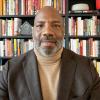
Q. In the past you had favoured levying money from tech companies to provide some kind of support for public interest journalism. Do you still think this could be a good idea under the current administration?
A. I don’t think that’s going to happen under this President. It wouldn’t have happened under the previous administration either. People are either abjectly opposed to it or too weak to actually pursue it. But it’s something that probably should happen. I just don’t think that it actually will.
Q. But if that happened, how would you define what a news organisation is? Or how would you distribute any subsidies? Those can be thorny questions…
A. Yeah, they can be. But this can be based on circulation or you can have a professional association that would function almost like a bar association. And if you are a member in good standing of this group, which would require meeting certain editorial standards, then you would qualify. Or it could be a completely different system.
But whenever people doubt this is possible, I always say that the US gives tax-free status to churches. There's a small number of completely scam churches and those people get prosecuted when they get caught. But the overwhelming majority of churches are people holding services and baptising babies. So if we can manage to do this with something as debatable and ethereal as religion, we should be able to figure out how to do that with something as practical and tangible as journalism.
Q. We might be on the cusp of a new round of disruption with the rise of generative AI. How should journalists approach this moment?
A. The organisations that have struck AI deals haven’t got huge sums of money, but it's better than nothing and it’s revenue at a difficult time. I don't know if that outweighs the copyright issues. I don't know if we get to an equitable position where we don't have AI systems ripping out stories and running lookalike versions of them.
And yet this is a dynamic period, and by disposition, I’m oriented towards the possibilities. We are just starting to scratch the surface about what those possibilities are. I hope AI will free us up to do other kinds of things.
Q. As a journalism educator, what do you hear from your students in terms of their fears or anxieties about this moment?
A. My students’ anxieties are about things you can imagine: Will they get a job? Will they be able to have a gratifying career? But overall, they are excited by journalism. They really love journalism. They want to pursue stories. They want to find out things they didn’t know.
Q. What do you say to them in terms of addressing those fears or those anxieties?
A. We are in an interim period. We are at a point where there’s less stability than there has been in modern history as it relates to journalism. At the same time, our work has never been more important. So we are doing this work in the interim while we feverishly work on the strategies that will allow us to bring back stability, and hopefully profitability, in a way that we can secure the future of this profession.
In every email we send you'll find original reporting, evidence-based insights, online seminars and readings curated from 100s of sources - all in 5 minutes.
- Twice a week
- More than 20,000 people receive it
- Unsubscribe any time
signup block
In every email we send you'll find original reporting, evidence-based insights, online seminars and readings curated from 100s of sources - all in 5 minutes.
- Twice a week
- More than 20,000 people receive it
- Unsubscribe any time


